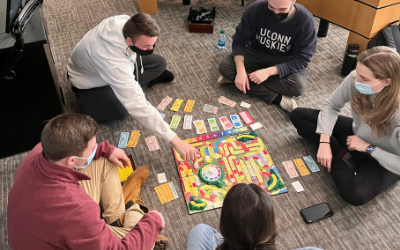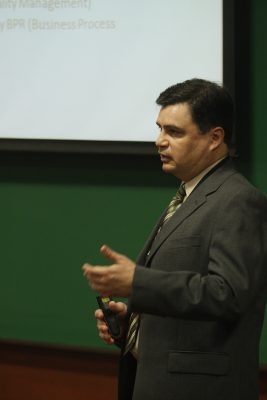In the fall of 2021, the supply chain crisis began to impact consumers and suddenly it became a term everyone was hearing. At the same time, Dr. Craig Calvert, Management and Engineering for Manufacturing (MEM) program co-Director and Assistant Professor-in-Residence for Operations and Information Management (OPIM) with the School of Business, was preparing to launch the first University of Connecticut course on supply chain management. After so much interest that fall, he also decided to offer a spring semester independent study on advanced supply chain management, during which his students are developing a board game to reinforce and teach supply chain concepts.
“Supply chains are dynamic and require constant adjustment and adaptation,” Dr. Calvert said. “When designing the supply chain management course I pulled from my years of professional and industry experience in supply chains along with speaking to other industry experts.”
Supply chain management is the process of managing the movement of goods and services from suppliers, as raw materials, and to end users, as finished goods in the most efficient and effective way. In the global economy, supply chains are becoming more complex and difficult to manage. This complexity has caused many of the supply chain shortages experienced during the COVID pandemic. As a result, supply chain management is a growing field, and more and more MEM graduates are being recruited for these roles each year due to their understanding of both the business and manufacturing aspects of supply chain management.
Introduction to Supply Chain Management Class
While many MEM students thought Intro to Supply Chain Management sounded like an interesting and different business elective to round out their MEM curriculum, it also has proven to have significant value for the students who have taken it, as well as those who continued and took the additional Supply Chain Management Independent Study with Dr. Calvert.
Luca Mastrogiacomo, MEM senior, notes that he took the class because he had really just learned the term supply chain and was interested to learn more. Now, he will be graduating with a job as the Supply Chain Coordinator of a small specialty ice cream company, Van Leeuwen Ice Cream, in Brooklyn, NY.
“I didn’t have any experience with supply chain,” said Paige Lombardi, MEM senior. “I thought it would be a fun elective, but the way Dr. Calvert taught this course, I retained more than from any other class. I can already see how it will apply to my future career.”
Liz Downey, MEM senior, agreed, “Intro to Supply Chain Management was such a great class. Even though it was about supply chain, I have been able to apply what I learned to other classes this semester.” She continued, “Learning accounting and finance is obviously important, but supply chain would be a great benefit to everyone, as well.”
While the Intro to Supply Chain Management course offered a general overview of supply chain topics, students say the course was very practical and experiential. “It was not just theory,” Lombardi said. “It was like being in a real life situation, which really made it practical and applicable, and this is probably why I retained so much of what we learned.”
“It was also great working alongside the MIS students, which made up about half of the class,” Mastrogiacomo said. “It was interesting to see the different ways students who were more focused on business thought about things like manufacturing and gave us all a lot of insights into areas we don’t know as much about. It was generally just more representative of a real work environment where you’re working with people from all kinds of educational and experience backgrounds.”
Dr. Calvert explains. “The in-class activities were designed so that the MEM students and MIS students would learn about each other’s discipline. Sometimes I had the different majors work together and other times I had them intentionally intermingle. I had several MIS students who had never taken an MEM course, and this class was their only exposure to how a manufacturing person would approach a problem.”
Independent Study Course and the Game Project Emerges
 The enthusiasm of the fall 2021 Intro to Supply Chain Management course was strong enough for Professor Calvert to offer an independent study section in the spring on the same topic. Five students enrolled, three of whom were from the MEM program and two from Management and Information Science (MIS) in the School of Business.
The enthusiasm of the fall 2021 Intro to Supply Chain Management course was strong enough for Professor Calvert to offer an independent study section in the spring on the same topic. Five students enrolled, three of whom were from the MEM program and two from Management and Information Science (MIS) in the School of Business.
“I really enjoyed the first class and that increased my interest in the field so I wanted to take the independent study also.” Mastrogiacomo said. “I liked that there was a lot of opportunity for problem solving and that it is very cross functional. It touches every area of a company and has a huge impact on their success or failure.”
The independent study allowed the students to explore Supply Chain Management more deeply, to apply what they learned already, and to develop new teaching methods to help future students understand how the supply chain works.
Dr. Calvert intentionally designed the course to utilize inquiry-based learning and to let them find and answer what “wonders” students have. Similar to project based learning, this style of teaching focused on exploring answers. “I have five bright students so I wanted to approach this differently and so far the inquiry-based learning model has worked,” Calvert said. “It is exciting to see students get excited about learning and have fun with the process.”
The five students, all seniors, worked together to develop a game that will reinforce supply chain concepts, such as managing risks, rewards, and complicating factors.
The game board, which is loosely based on the game of LIFE, features landing points such as Risk, Rewards, Stop, Pay Day, and Neutrals points, as well as Knowledge Checks. While nothing may happen at the Neutral squares and when landing on Knowledge Checks students will have to answer questions from the Intro to Supply Chain Management course, Risks, Pay Days, and Stop Points are all familiar challenges or rewards that could happen in any supply chain scenario.
Lombardi explains, “Along the game, you have to keep stopping and there are lots of decisions to be made along the way that ultimately affect profit. The goal is to have the biggest profit, and your pay or rewards vary based on decisions you make regarding number of workers, their education levels, contracts you’ve made, etc. There are various risks and you have a chance to reevaluate your decisions at the stop points.”
Downey, Lombardi and Mastrogiacomo all agree that supply chain management is an important course for MEM students to take and that Dr. Calvert made this a unique and engaging course that will benefit them in any career.
“People hear the word and don’t really know what is involved,” Mastrogiacomo said. “It is a little different than what most people think MEM graduates end up doing, but it really touches on a lot of the areas that they do and the concepts are important to know about.”
 What has surprised Connor the most was working in logistics for fashion and luxury goods, after starting his career in a manufacturing heavy environment.
What has surprised Connor the most was working in logistics for fashion and luxury goods, after starting his career in a manufacturing heavy environment. There she is in charge of sourcing spare parts to military bases for the F135 enginer. Her position in particular focuses on supplying deployed carrier ships.
There she is in charge of sourcing spare parts to military bases for the F135 enginer. Her position in particular focuses on supplying deployed carrier ships.
 Even while missing home, Nunez always wanted to come to the United States, even as a young child. He has always enjoyed US culture, music, values and way of life, so that made adjusting to the American way of life a little easier for him. He loves the culture, so he has always felt at home here. He says the biggest adjustment was driving in bad weather conditions in New England winters.
Even while missing home, Nunez always wanted to come to the United States, even as a young child. He has always enjoyed US culture, music, values and way of life, so that made adjusting to the American way of life a little easier for him. He loves the culture, so he has always felt at home here. He says the biggest adjustment was driving in bad weather conditions in New England winters.